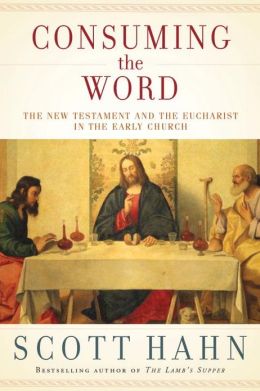One perk of being a book reviewer is that publishers regularly send emails and catalogs promoting their newest titles, along with a steady stream of advanced review copies. I try to review as many as I can.
However, I can’t get to them all, so each month I highlight a few new and upcoming books that I’m particularly excited about.
(The descriptions below are either from the publisher or from Amazon.)
Consuming the Word: The New Testament and The Eucharist in the Early Church
by Dr. Scott Hahn
Image, 176 pages, hardcover
Released on May 28, 2013
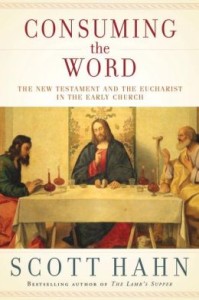 From the bestselling author of The Lamb’s Supper and Signs of Life comes an illuminating work that unlocks the many mysteries of the Catholic sacrament of the Eucharist.
From the bestselling author of The Lamb’s Supper and Signs of Life comes an illuminating work that unlocks the many mysteries of the Catholic sacrament of the Eucharist.
Long before the New Testament was a document, it was a sacrament. Jesus called the Eucharist by the name Christians subsequently gave to the latter books of the Holy Bible. It was the “New Covenant,” the “New Testament,” in his blood. Christians later extended the phrase to cover the books produced by the apostles and their companions; but they did so because these were the books that could be read at Mass.
This simple and demonstrable historical fact has enormous implications for the way we read the Bible. In Consuming the Word: The New Testament and the Eucharist in the Early Church, Dr. Scott Hahn undertakes an examination of some of Christianity’s most basic terms to discover what they meant to the sacred authors, the apostolic preachers, and their first hearers. Moreover, at a time when the Church is embarking on a New Evangelization he draws lessons for Christians today to help solidify their understanding of the why it is Catholics do what Catholics do.
Anyone acquainted with the rich body of writing that flows so inspiringly from the hand and heart of Dr. Hahn knows that he brings profound personal insight to his demonstrated theological expertise,” writes Cardinal Donald Wuerl in the foreword to the book. Consuming the Word continues in that illustrious tradition. It brings us a powerful and welcome guide as we take our place in the great and challenging work in sharing the Good News.
Dangers to the Faith: Recognizing Catholicism’s 21st Century Opponents
by Al Kresta
Our Sunday Visitor, 208 pages, paperback
Released on May 31, 2013
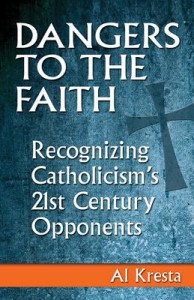 A storm has been brewing in society and its treatment, views, and activities toward the Catholic Faith.
A storm has been brewing in society and its treatment, views, and activities toward the Catholic Faith.
Some are subtle, others are more brazen—New Age thought, questionable spirituality, “creedless” Christianity, relativism, scientific skepticism, the triumph of technology, and even the self-styled spirituality of Oprah Winfrey. All these masquerade as “truth,” making it tough for the average Catholic to know how to resist, let alone respond.
No one is more qualified to pull back the curtain on the challenges the Catholic Church faces today than Al Kresta, popular Catholic author, speaker, and radio show host. A revert to Catholicism, Kresta is well known for his rigorous examination of topics in art, religion, academia, and business.
Dangers to the Faith: Recognizing Catholicism’s 21st Century Opponents is the perfect springboard for discussing the new world in which the Catholic Church exists today. Learn how to better carry out the missionary mandate of the Church. The question isn’t whether you will be a witness to Christ, but whether you will be a faithful witness.
Medical Saints: Cosmas and Damian in a Postmodern World
by Jacalyn Duffin
Oxford University Press, 256 pages, hardcover
Released on May 31, 2013
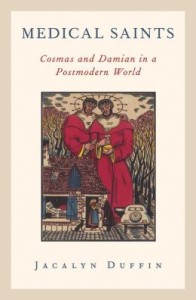 Cosmas and Damian were martyred around the year 300 A.D. in what is now Syria. Called the Anargyroi (“without silver”) because they charged no fees, they became patrons of medicine, surgery, and pharmacy and the focus of cults ranging across Europe. They were popular in Byzantine and Orthodox traditions and their shrines are numerous in Eastern Europe, southern Italy, and Sicily. The Medici family of Florence viewed the “santi medici” as patrons, and their deeds were illustrated by great Renaissance artists. In medical literature they are now revered as patrons of transplantation.
Cosmas and Damian were martyred around the year 300 A.D. in what is now Syria. Called the Anargyroi (“without silver”) because they charged no fees, they became patrons of medicine, surgery, and pharmacy and the focus of cults ranging across Europe. They were popular in Byzantine and Orthodox traditions and their shrines are numerous in Eastern Europe, southern Italy, and Sicily. The Medici family of Florence viewed the “santi medici” as patrons, and their deeds were illustrated by great Renaissance artists. In medical literature they are now revered as patrons of transplantation.
Jacalyn Duffin offers a profound exploration of illness and healing experiences in contemporary society through the veneration of the twin doctors Saints Cosmas and Damian. She also relates a personal journey, from her role as a hematologist who unexpectedly came to serve as an expert witness in the Church’s evaluation of a miracle to her research as a historican on the origins, meaning, and functions of saints.
Duffin’s research, which includes interviews with devotees in both North America and Europe, focuses on how people have taken the saints with them as they moved both within Italy and beyond. She shows that veneration of Cosmas and Damian has spread beyond immigrant traditions to fill important functions in healthcare and healing. Duffin’s conclusions provide essential insights into medical history, sociology, anthropology, and popular religion, as well as the current medical debate over spiritual healing. Medical Saints draws on medical history and Roman Catholic traditions, but extends to universal observations about the behaviors of sick people and the formal responses to individual illness from collectivities in religion, medicine, and history.
Pope Francis: Conversations with Jorge Bergoglio: His Life in His Own Words
by Sergio Rubin
Putnam, 304 pages, hardcover
Released on April 30, 2013
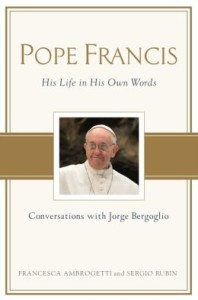 On March 13, 2013, the former Cardinal Jorge Mario Bergoglio, longtime Archbishop of Buenos Aires, now Pope Francis, was elected to succeed Pope Benedict. He is the first Latin American pope, the first Jesuit pope, and the first to take the name Francis, after St. Francis Assisi, the 13th century monk known for his charity and kindness.
On March 13, 2013, the former Cardinal Jorge Mario Bergoglio, longtime Archbishop of Buenos Aires, now Pope Francis, was elected to succeed Pope Benedict. He is the first Latin American pope, the first Jesuit pope, and the first to take the name Francis, after St. Francis Assisi, the 13th century monk known for his charity and kindness.
Elected in one of the shortest conclaves in history, the former Archbishop Jorge Mario Bergoglio of Argentina reveals, in a series of extensive interviews conducted over the course of two years, the very image of a humble priest, inspired teacher, and wise and adroit cardinal. What emerges is a portrait of a man more interested in substance over style, a compassionate cleric and teacher who has shunned the spotlight. In spontaneous, intimate terms, Archbishop Bergoglio, now Pope Francis, covers topics as wide-ranging as his childhood, family life, and the importance of his first job to discovering his calling and his early days in the seminary. The former archbishop was a teacher of psychology and literature until John Paul II consecrated him as a cardinal. He befriended writers like Jorge Luis Borges and cites Homer, Cervantes, and German and Italian poets with ease and offers nuanced thoughts about teaching. Thoughtful, intelligent, and even witty, he names Babette’s Feast as his favorite movie and Marc Chagall as his favorite painter.
A learned and introspective man, he does not avoid the uncomfortable subjects: the declining numbers of priests and nuns; celibacy; the sexual abuse scandals that have rocked the Church; and his opinions about and experience with the military dictatorship of his own crisis-riddled country. It also discusses the incredible role he played in the last conclave, where he is said to have been tied with Ratzinger in the second of three votes, and asked that the votes for him be transferred to Ratzinger.
Through his own words, we come to know a man whose actions and words reflect his deeply-rooted humility. The book concludes with the Pope’s own writings and reflections, full of wisdom and inspiration.
What new and notable books are you looking forward to?

